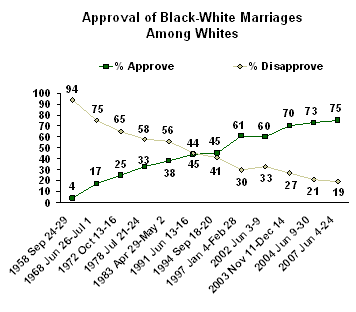Intercultural relationships have a very large payout when it comes to rewards gained, but often times take a lot of work and commitment. Many types of stress influence these relationships including the historical context. An example of how history plays a role in intercultural communications and intercultural relationships that can be easily seen is how Americans have treated Japanese people throughout the past 150 years. Relationships end up strained, especially if a majority group member does not realize that many Japanese people were restricted by Americans with the Oriental Exclusion Act, as well as Japanese internment camps.
The concept discussed in the text about viewing intercultural relationships dialectically, using the historical context, can be applied to a intercultural marriages. In 1958, most people in America disapproved of intercultural marriages. Fortunately, with the advance of information availability and education, that statistic has almost been reversed.
(Carroll, 2007)
In my life, I will try my best not to fall victim to the historical contexts regarding intercultural communication, and do my best to keep an open mind about everything. This might be more important when I am older, and possibly out of touch with the current young generation. I will also consider this concept when thinking about how people act towards each other. Possibly there will be a historical event that has modified their behavior or in the very least way of thinking.
References
Carroll, J. (2007). Most americans approve of interracial marriages. Gallup, Retrieved from http://www.gallup.com/
Martin, J. N., & Nakayama T. K. (2009). Intercultural communication in contexts (5th ed.). New York, NY: McGraw-Hill Higher Education.

I really like the graphic you included. I would be interested to know if this trend is true for most historic intercultural interactions when it comes to relationships.
ReplyDeleteHistorical effects on intercultural relationships are a thing of the past. With the advent of interstellar space flight and positive outcomes of the SETI program, it may be more crucial to develop protocols for interspecies relationships. What do you think? Should we allow or not allow the white woman (as described in Martin and Nakayama, the white woman is most likely to pursue an intercultural relationship) to engage in a relationship with ET suitors?
Delete